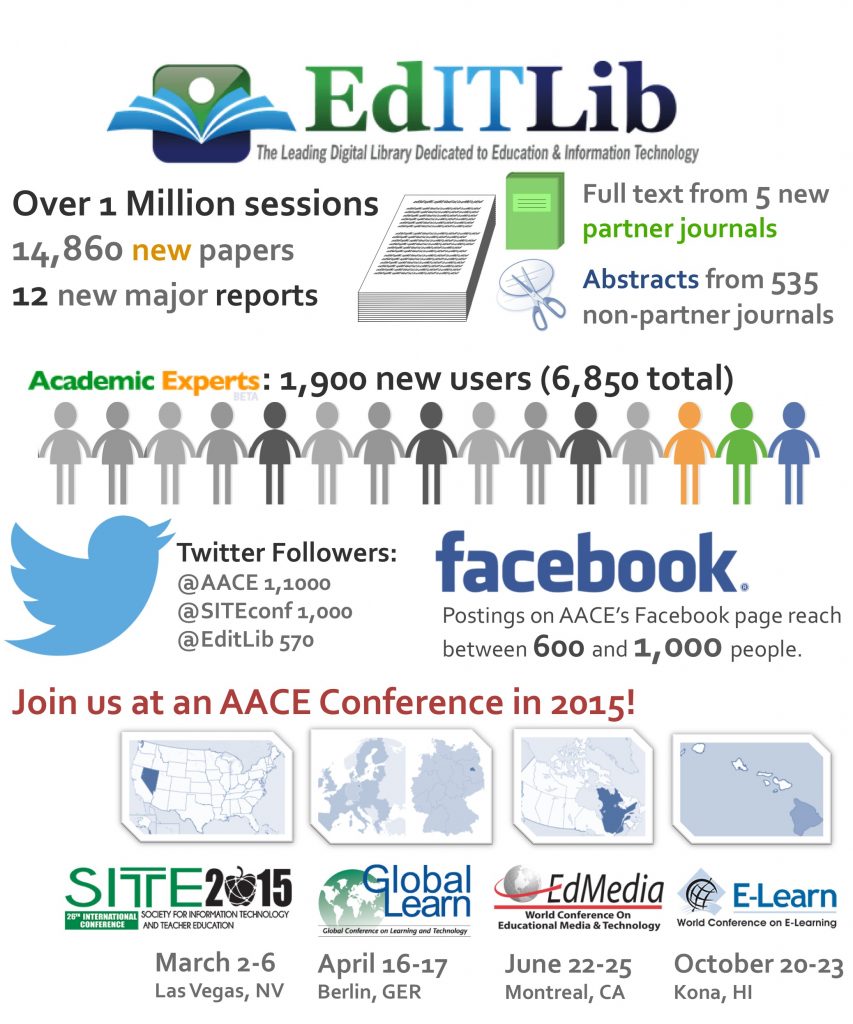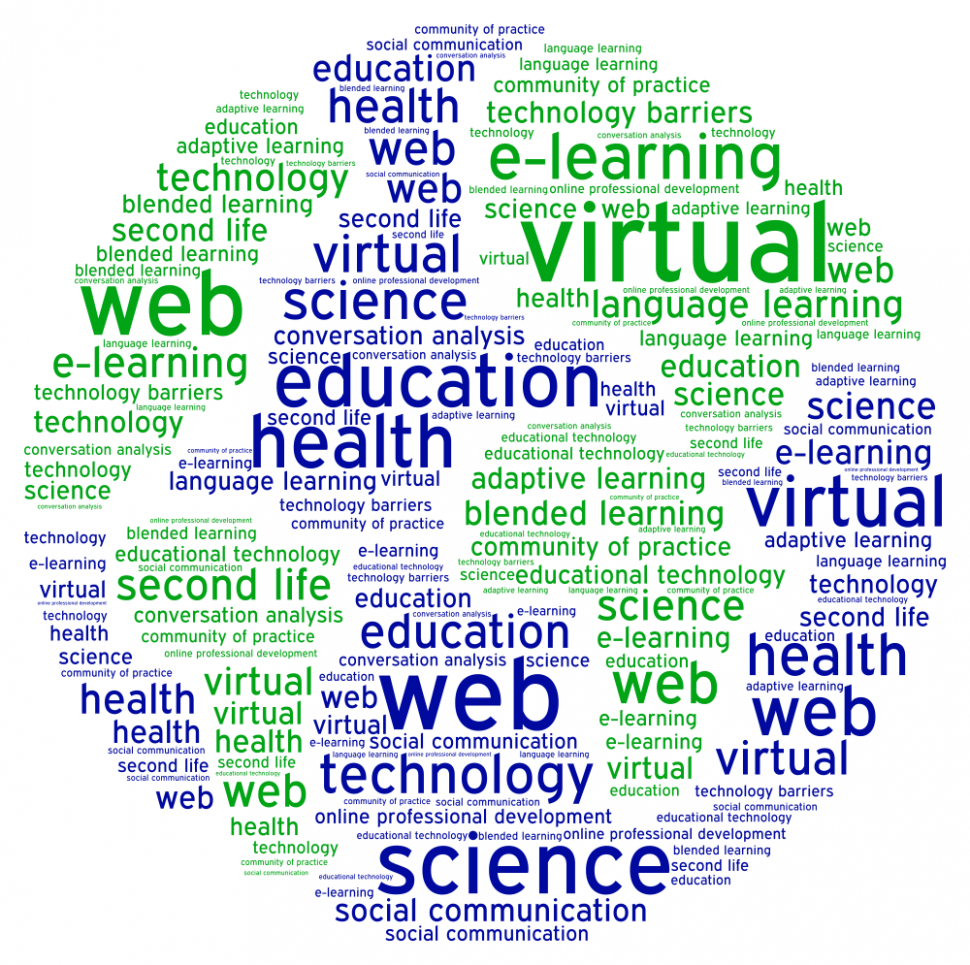2014: Thanks for AACE Community EdITLib Contributions & 12 Most Popular Articles
For a growing number of researchers and practitioners, EdITLib–Education & Information Technology Digital Library is the go-to resource for high-quality content. In 2014, the library greatly increased the value for researchers and educators by adding a number of journals and proceedings.
Special thanks to the AACE community who enriched the dialogue around educational technologies and innovative pedagogical approaches as AACE conference participants, speakers, presenters, reviewers, editors, and journal contributors.
The infographic below gives an overview of EdITLib and AACE activity followed by a list of the 12 most popular articles for the year.

The Year 2014 – Trends, Facts & Figures

World cloud of the 20 most popular search terms of 2014 (produced with tagul.com)
12 Most Popular Articles in 2014
The selection of the 12 most popular articles in 2014 offers a potpourri of trends, ongoing issues and current debates. The full text of each paper is available in EdITLib. Enjoy, reflect, learn and connect to the AACE community.
1. Comparative Analysis of Learner Satisfaction and Learning Outcomes in Online and Face-to-Face Learning Environments
This empirical study compared a graduate online course with an equivalent course taught in a traditional face-to-face format on a variety of outcome measures. Results revealed that the students in the face-to-face course held slightly more positive perceptions about the instructor and overall course quality although there was no difference between the two course formats in several measures of learning outcomes.
2. Characteristics of Adult Learners With Implications for Online Learning Design
The online educational environment is increasingly being used by adults and should be designed based on the needs of adult learners. This article discusses andragogy, an important adult learning theory, and reviews three other adult learning theories: self-directed learning, experiential learning, and transformational learning.
3. What is Technological Pedagogical Content Knowledge (TPACK)?
This paper describes a framework for teacher knowledge for technology integration called technological pedagogical content knowledge (originally TPCK, now known as TPACK, or technology, pedagogy, and content knowledge).
4. Social Presence Theory and Implications for Interaction and Collaborative Learning in Computer Conferences
This paper examines research on social presence theory and the implications for analyzing interaction, communication, collaborative learning, and the social context of computer-mediated communication (CMC). Even though CMC is considered to be a medium that is low in social context cues, it can be perceived as interactive, active, interesting, and stimulating by conference participants.
5. Digital Literacy: A Conceptual Framework for Survival Skills in the Digital era
Digital literacy involves more than the mere ability to use software or operate a digital device; it includes a large variety of complex cognitive, motor, sociological, and emotional skills, which users need in order to function effectively in digital environments.
6. Integrating Technology into the Classroom: Eight Keys to Success
There are many issues related to the successful use of technology in the classroom. While attention to choosing the appropriate hardware and software for the classroom is prerequisite, it is the skill and attitude of the teacher that determines the effectiveness of technology integration into the curriculum.
7. Teachers’ Views on Factors Affecting Effective Integration of Information Technology in the Classroom: Developmental Scenery
This article reports on an exploratory, longitudinal study, which examined six teachers’ views on the factors that affect technology use in classrooms. The research examined teachers of grades 4, 5, and 6-for three years, studying the teachers both as a group and as individual case studies.
8. Issues in Distance Learning
This review of literature and research into the effectiveness of distance education systems deals with a number of factors which affect their success or failure.
9. Humanizing the Classroom by Flipping the Homework versus Lecture Equation
Innovative educators are using technology to revolutionize teaching by inverting or flipping the homework versus lecture equation. In an inverted or flipped classroom, students review pre-recorded lecture content online before class, freeing class time for active learning.
10. Moodle: Using Learning Communities to Create an Open Source Course Management System
This paper summarizes a PhD research project that has contributed towards the development of Moodle – a popular open-source course management system (moodle.org). In this project we applied theoretical perspectives such as “social constructionism” and “connected knowing” to the analysis of our own online classes as well as the growing learning community of other Moodle users.
11. iPads in the Classroom – New Technologies, Old Issues: Are they worth the effort?
This paper presents the results of a research project that involved introducing iPads into two elementary school classrooms to support the development of student digital storytelling skills. This project resulted in many positive learning experiences with the technology, with storytelling and across other components of the curriculum and the community.
12. Key Factors for Determining Student Satisfaction in Online Courses
One-hundred five respondents out of a sample of 303 online learners completed the resulting Online Course Satisfaction Survey. The results indicated student satisfaction with online courses is influenced by 3 constructs: instructor variables, technical issues, and interactivity.
